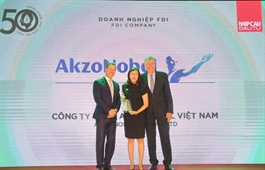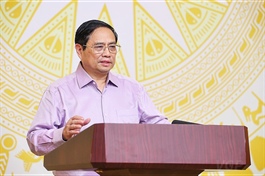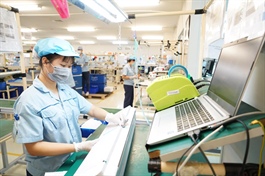Tra Vinh nurtures private sector to kickstart economy
Tra Vinh nurtures private sector to kickstart economy
Tra Vinh’s economy has flourished in recent years, with various encouraging indicators of recovery – and the Mekong Delta province’s emphasis on boosting the private sector is one of the primary reasons.
In the first half of this year, Tra Vinh province has issued registration certificates to 250 businesses. Among which, there are 165 one-member limited liability companies; 45 multi-member limited liability companies; 20 private enterprises; 20 joint stock companies; and 151 affiliated units. The overall amount of registered capital hit around $169 million, and the total number of registered personnel reached nearly 3,800 individuals.
There are just under 3,000 active businesses with a total capitalisation of $2.1 billion and nearly 90,800 workers. Some 44 of those businesses are foreign-invested firms. In addition, almost 500 firms and affiliated units were registered for expanded business lines, capital, and other adjustments, increasing the total extra capital to $143 million.
The 48MW South Korea-Tra Vinh offshore wind power plant became operational in September 2021
According to Tra Vinh Department of Planning and Investment, compared to the same period in 2021, the number of newly-established enterprises reached 42. Online registration was selected by over 60 per cent of enterprises, an increase of 10 per cent on-year. The average capital per enterprise was over $676,000.
This outcome is dedicated to the province’s concentration on implementing Resolution No.10-NQ/TW, issued in 2017 on developing the private sector into a key driving force of an efficient socialist-oriented market economy. Accordingly, Tra Vinh Party Committee published a programme in the same year with specific instructions for provincial agencies, branches, and localities.
Since 2018, Tra Vinh has adopted a number of measures and regulations aimed at enhancing the investment and startup environment and promoting the sustainable growth of private businesses. During this period, the province saw the establishment of just over 1,500 new businesses, totalling $777 million in capital and employing nearly 26,000 individuals. The number represents roughly two-thirds of the target outlined in the midterm resolution of the 11th Provincial Party Congress. The goal of the resolution is to establish 5,000 businesses by 2025.
Between 2017 and 2021, the private sector has considerably contributed to Tra Vinh’s socioeconomic growth. The province’s regional GDP increased by 8.81 per cent annually, reaching $2.7 billion in 2021. The sector created 61.05 per cent of regional GDP with an average annual growth rate of 6.87 per cent and contributed $393 million, equivalent to 10.6 per cent of the total provincial budget revenue.
The total export turnover hit $2.15 billion, with the three main export groups being light industry, handicrafts, and agricultural and aquatic products. Notably, gross output of industry in the first seven months of this year was $788 million, reaching almost half of the plan. The province regularly monitors and supports investors in the implementation and construction of four wind power projects, contributing $366 million to the estimated budget and reaching 82 per cent of the 2022 target.
The province has prioritised assisting the private sector to innovate and modernise production technology while boosting training and labour output. In addition, the province has implemented innovative startup initiatives in accordance with 2016 directives.
At the start of 2020, the provincial People’s Committee prepared a support plan for the 2020-2022 period, with a vision toward 2025. The provincial startup ecosystem is, therefore, developed and implemented, providing a space for startup ideas and activities, conducting events and seminars, and linking local entrepreneurs to other ecosystems.
Furthermore, Tra Vinh also promotes investment in agriculture while participating in the commodity industry’s value chain. From 2017 to 2021, the province has captured 22 investment projects with a total investment capital of up to $44 million.






















